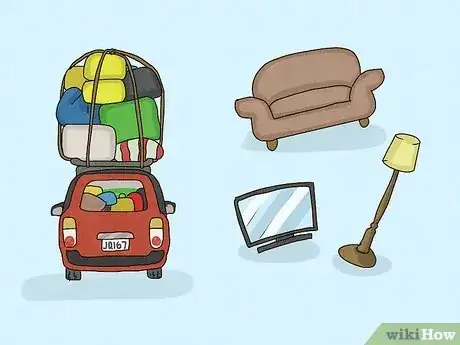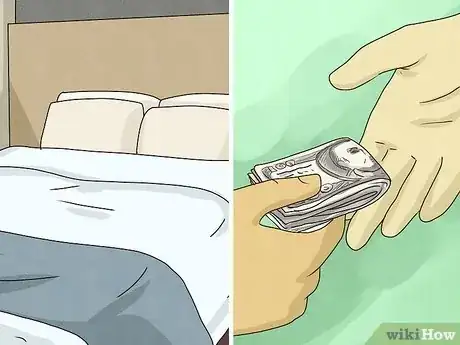This article was co-authored by Kelli Miller, LCSW, MSW. Kelli Miller is a Psychotherapist based in Los Angeles, California. Kelli specializes in individual and couples therapy focusing on relationships, depression, anxiety, sexuality, communication, parenting, and more. Kelli also facilitates groups for those struggling with alcohol and drug addiction as well as anger management groups. She is the author of “Professor Kelli’s Guide to Finding a Husband” and the award-winning and best-selling book “Thriving with ADHD”. Kelli co-hosted an advice show on LA Talk Radio and is a relationship expert for The Examiner. She received her MSW (Masters of Social Work) from the University of Pennsylvania and a BA in Sociology/Health from the University of Florida.
There are 8 references cited in this article, which can be found at the bottom of the page.
wikiHow marks an article as reader-approved once it receives enough positive feedback. In this case, 80% of readers who voted found the article helpful, earning it our reader-approved status.
This article has been viewed 696,061 times.
Are you frustrated because your kids are grown up and old enough to be self-sufficient, yet they're still living with you? Is your home starting to feel like a free hotel? If you've decided it's time for one or more of your children to leave the nest, but they refuse to spread their wings, here's what to do.
Steps
Determining Whether Your Child Is Taking Advantage Of You
-
1Assess the situation as objectively as possible. As a parent, you might have mixed feelings about encouraging your child to move out. On one hand, you might enjoy the company, or you don't want them to struggle on their own, or you don't want to feel like you're "kicking" anyone out. On the other hand, perhaps you sense that your child is not pulling his/her own weight, and if you don't take action s/he might never become self-sufficient. It's important to sort through all of these feelings before you talk to your child.[1]
-
2Make a list of the reasons you want your child to move out. Be honest -- confront any ways in which having your child live at home makes you feel uncomfortable, and don't allow guilt to make you bite your tongue. Some reasons are obvious, such as if your child blatantly disrespects your privacy or belongings. Some reasons are subtle and somewhat personal and embarrassing, like overhearing your child with their lover(s), or the fact that you seem to be the one who ends up doing their laundry.[2]
- Consider whether there is a real reason your child cannot live on their own. Sometimes a parent is reluctant to push a child out of the house if they believe the child simply doesn't have the resources to live independently. In most cases, however, the child is perfectly capable of being independent, but it will require some downgrading -- like moving from a house to a bare-bones apartment with roommates. If you determine this is the case, recognize that by allowing your child to stay, you're catering to their comfort, not to real circumstances.
Advertisement -
3Don't be a snoop. It's bad enough your child feels unable to live out there as an individual without having parents show a huge lack of trust. Do not invade your child's privacy by going through their belongings. You're all adults, so come out and ask what you want to know.[3]
Addressing the Need to Move Out
-
1Show a united front. It's very common for one parent to want a child to move out and the other parent to be resistant to the idea.[4] But before you can nudge your child towards independence, you've got to be on the same page. See How to Compromise With Your Spouse.
-
2Ask your child if they want to move out. This is a simple question, but will reveal a lot about why your child is still living at home. Usually, the answer will be something like "Yeah, of course, but..." followed by a list of reasons why it just can't happen at the moment. Evaluate those reasons objectively, keeping in mind that there are probably other reasons --real reasons - that your child hasn't verbalized, such as that they enjoy having you to do their laundry, or being able to use your car without having to make car or insurance payments, etc. Ask your child about their goals as well so you know what they want to do with their life. What you want to do is address the verbalized reasons (which, in many cases - but not all - are excuses) one by one, with facts:
- "I'm looking for a job." Is that true, really? How often are they checking classifieds and job sites? In the meantime, are they volunteering so that they can make contacts, and can account for any gaps in their resume? Are they looking for "a" job or "the" (perfect) job? Are they unwilling to work a minimum wage job until they find something better?
- "I can't afford a place." Is it that your child can't afford a place, or that they can't afford a place as comfortable as your place? Maybe they can't afford a place in your neighborhood and there's a reason for that; living in a nice neighborhood is one of the rewards of having a successful career. Look around: Where do other young adults live? Does your child feel like they're "too good" to live there? Do you feel like they're "too good" to live there?
- "I want to save up for a house, car, grad school, etc." This is probably the most legitimate reason to stick around at home, but only if your child is accountable to it. How much do they actually have saved up? What is the ultimate goal? Are they consistently putting money away, or do their savings patterns depend on how many good movies or video games are out that week? If they can prove that saving money is a priority for them, it's all good. But don't just take your kid's word for it. If that's the reason for staying home and getting a free ride, you're entitled to see pay stubs and bank statements, just like financial aid offices are entitled to see tax forms before they provide financial assistance. So you need to develop some strategies to establish a new adult-to-adult relationship.
Setting a Deadline
-
1If you make up your mind that your adult child is ready to move out, set a deadline. Inform the child that the deadline stands or rent begins, along with associated requirements for paying a share of the water, the electricity bill, heating costs, service costs, etc. Being forced to chip in can often make living independently seem more viable.[5]
- Have your adult child make a plan. For example, get a job,[6] save paychecks, look for an apartment, and so forth.
- Pick up boxes and get a calendar; start marking off the days with great show.
-
2When it gets closer to the date, start going over what the adult child will/will not take with them. For example, furniture, bedding, etc.
-
3If the deadline passes, get serious. Send bills and part payment demands. If these are not met, start disconnecting services, cable, phone, etc.
-
4If they have made up yet another excuse about why they aren't quite ready to move out, charge rent for their room.[7] Chances are they are not going to be too comfortable paying rent for a room. This will get them mad and they will want to move out fast!
Expert Q&A
-
QuestionWhat do you do when your child refuses to leave the house?
 Kelli Miller, LCSW, MSWKelli Miller is a Psychotherapist based in Los Angeles, California. Kelli specializes in individual and couples therapy focusing on relationships, depression, anxiety, sexuality, communication, parenting, and more. Kelli also facilitates groups for those struggling with alcohol and drug addiction as well as anger management groups. She is the author of “Professor Kelli’s Guide to Finding a Husband” and the award-winning and best-selling book “Thriving with ADHD”. Kelli co-hosted an advice show on LA Talk Radio and is a relationship expert for The Examiner. She received her MSW (Masters of Social Work) from the University of Pennsylvania and a BA in Sociology/Health from the University of Florida.
Kelli Miller, LCSW, MSWKelli Miller is a Psychotherapist based in Los Angeles, California. Kelli specializes in individual and couples therapy focusing on relationships, depression, anxiety, sexuality, communication, parenting, and more. Kelli also facilitates groups for those struggling with alcohol and drug addiction as well as anger management groups. She is the author of “Professor Kelli’s Guide to Finding a Husband” and the award-winning and best-selling book “Thriving with ADHD”. Kelli co-hosted an advice show on LA Talk Radio and is a relationship expert for The Examiner. She received her MSW (Masters of Social Work) from the University of Pennsylvania and a BA in Sociology/Health from the University of Florida.
Psychotherapist Ask your child about what their long-term goals are—as humans, we really only do things if we want them ourselves. The first step is really talking about what they want to do and where they see themselves in the future, and potentially looking for ways to help them with those plans. At that point, you could try to establish a deadline for when they'd move out.
Ask your child about what their long-term goals are—as humans, we really only do things if we want them ourselves. The first step is really talking about what they want to do and where they see themselves in the future, and potentially looking for ways to help them with those plans. At that point, you could try to establish a deadline for when they'd move out. -
QuestionMy 37-year-old son, his wife, and their 4 children have lived with me for 1 1/2 years. They have had 4 months notice to leave, and pay no bills so they could save, but they haven't saved. What can I do?
 Community AnswerGive them a 4 week notice and then apply for an eviction order. You've given them plenty of chances at this point, and they'll continue to walk all over you if you let them.
Community AnswerGive them a 4 week notice and then apply for an eviction order. You've given them plenty of chances at this point, and they'll continue to walk all over you if you let them. -
QuestionHow can I write a letter to my 45 year old daughters to move out? They both have jobs. I have helped them the past couple of years and I want to sell my house now.
 Community AnswerTell them you are putting the house on the market and they need to find another place to live. Don't allow them to move to your new place.
Community AnswerTell them you are putting the house on the market and they need to find another place to live. Don't allow them to move to your new place.
Warnings
- Before going so far as to change locks, remove belongings, etc., understand your local laws regarding the eviction of tenants. Even though they are family and may not be paying rent, many places have eviction laws that may apply and must be followed.⧼thumbs_response⧽
- Remember that the economy is very difficult right now. Jobs can be scarce and low paying, but housing and living expenses are high. Be reasonable in your expectations.⧼thumbs_response⧽
- Be sure that your child is not suffering from some mental illness, such as depression.[8] These illnesses can be debilitating. You may need to help them get them help. Although once a child reaches the age of majority (is no longer a minor), you have no obligation to him or her, denying that there is an actual illness working in this type of situation is irresponsible and potentially harmful to your child.⧼thumbs_response⧽
- Some of the less expensive areas may be unsafe. Make sure the place your child intends to move to doesn't have a high crime rate.⧼thumbs_response⧽
Expert Interview

Thanks for reading our article! If you'd like to learn more about relationships, check out our in-depth interview with Kelli Miller, LCSW, MSW.
References
- ↑ https://www.psychologytoday.com/us/blog/liking-the-child-you-love/201707/5-ways-your-struggling-adult-child-may-be-manipulating-you
- ↑ https://www.focusonthefamily.com/family-q-and-a/parenting/asking-a-grown-child-to-move-out-of-the-house
- ↑ https://www.empoweringparents.com/article/failure-to-launch-part-3-six-steps-to-help-your-adult-child-move-out/
- ↑ https://www.psychologytoday.com/us/blog/liking-the-child-you-love/201604/creating-boundaries-your-adult-child
- ↑ https://money.usnews.com/money/personal-finance/family-finance/articles/2018-07-31/how-to-kick-your-adult-child-out-of-the-house
- ↑ https://grownandflown.com/help-kid-get-a-job/
- ↑ https://money.usnews.com/money/blogs/my-money/2015/06/30/why-parents-should-charge-their-kids-rent
- ↑ https://www.helpguide.org/articles/depression/depression-symptoms-and-warning-signs.htm
About This Article
The easiest way to get your adult child to move out is to ask them to move out. Don't overthink it, just say something like "Jake, I think it's time you move out of the house." If they respond with excuses about why this isn't possible, answer them with facts, such as by explaining they could rent a smaller place if they say they can't afford to live alone. Then, set a deadline for your child to move out and explain that if they want to stay on longer, they will have to pay rent, and contribute to bills and other service charges. For tips on how to tell if your child is taking advantage of you by staying at home, read on!







































































Medical Disclaimer
The content of this article is not intended to be a substitute for professional medical advice, examination, diagnosis, or treatment. You should always contact your doctor or other qualified healthcare professional before starting, changing, or stopping any kind of health treatment.
Read More...